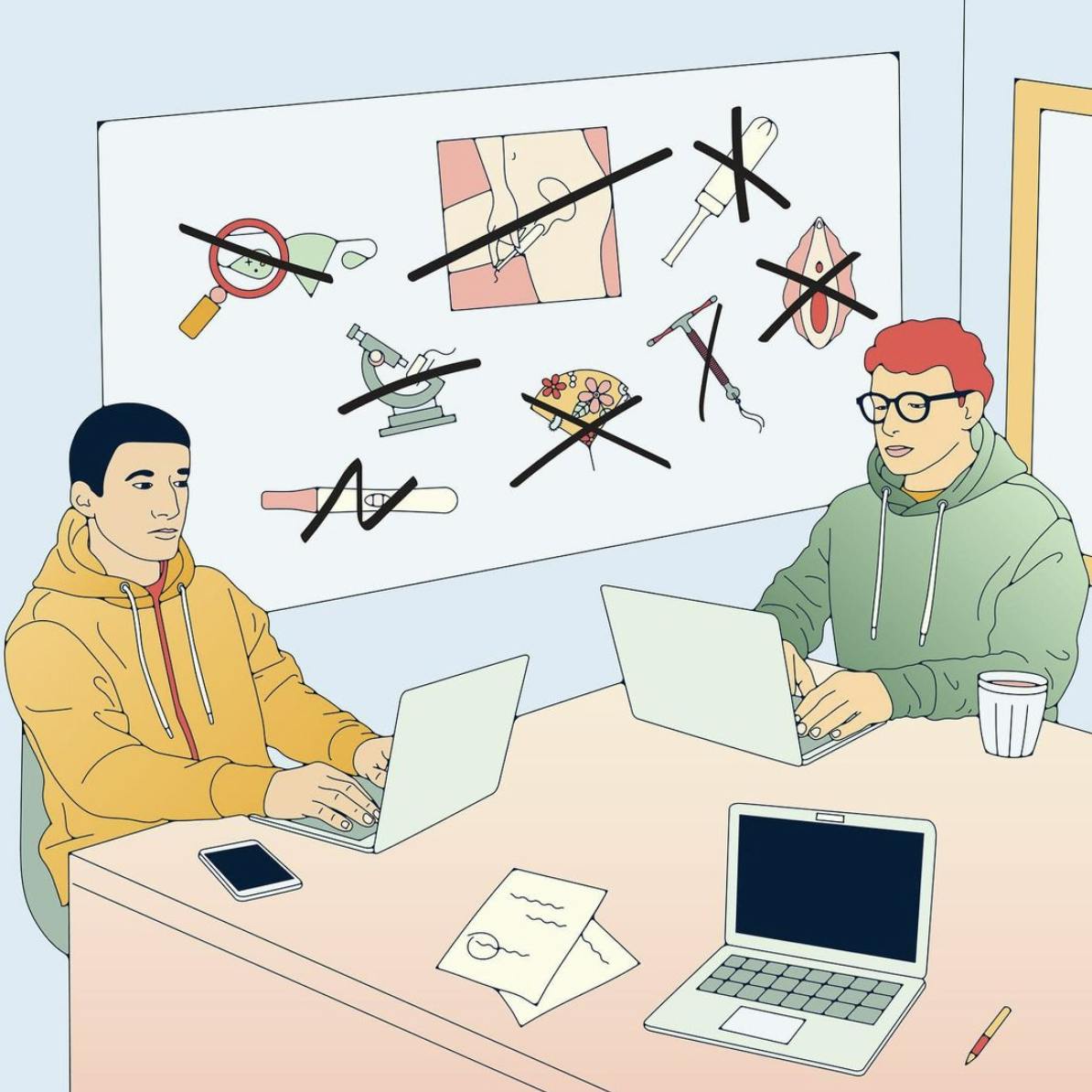Table of contents
1. What does social media censorship mean for women's health companies?
2. The female body - flagged as sexual content
3. Is Facebook algorithm the one to blame?
Illustrated by Erin Rommel
Thanks to the power of social media, we are more open than ever to changing the narrative around women’s health. Whether it’s discussing period pain, chronic illness, or gaslighting, social media has created the space to shine our spotlight on important health topics.
That is, of course, until Big Tech suddenly decides to censor us.
What does social media censorship mean for women's health companies?
Earlier in the year, the charity Endometriosis UK, reported that some of their followers were unable to post about their endo experiences for endometriosis awareness month. Users had captions seemingly removed if they used words or hashtags such as “endometriosis” and “menstruation”; with some even finding themselves blocked from posting altogether. Whilst this issue was eventually resolved, it only touches the surface of the ongoing censorship that faces many female health advocates and brands on social media.
The female health platform Daye has recently found itself in a similar predicament. As a business that relies on the power of social media to spread real life testimonials of the benefits of their CBD tampons, Daye suddenly found their Facebook ad account blocked several times due to advertising tampons and vaginal probiotics.
“We work hard to make sure our products can reach the people who need it most, and often those customers are suffering with conditions such as endometriosis, PCOS, and chronic pain. We rely heavily on paid advertising to increase our brand awareness and reach, and it takes time to build learnings into a successful ad account. When our account is blocked, we essentially have to start from scratch, which really stifles our progress" explains Victoria Ilieva, Digital Marketing Lead at Daye. “Businesses that sell products that include CBD for example are up against the odds before they’ve even clicked ‘post’- you’ve got to find a ways to promote your brand without upsetting the algorithm Gods and ultimately having your social pages removed altogether,” explains social media expert Hannah O’Donoghue-Hobbs.
The female body - flagged as sexual content
Restricting a brand’s advertisement isn’t an issue that’s limited to those operating in the CBD market; it extends to conversations around periods, underwear and all aspects of women’s health in general. Lucy Self runs Save my Knickers, a blood stain remover for underwear, and shares similar experiences. “I used real customers in my adverts and cropped them to show the middle part of their bodies, so they could remain anonymous. It was all about showing real bodies and wasn’t at all sexual, but it was blocked,removed and marked as inappropriate.” For Lucy, this is not just about censorship of images she uses, but a ban on female health terms too. “I’ve had my whole facebook ads account shut down due to the language I use. Save my Knickers is a blood stain remover and blood stains are a fact of life.” she adds. Lucy says this issue was eventually resolved after working with Facebook who then reopened the account.
“
It’s such a shame that a natural function of our human body, that half of the human population experience at some point in their lives, is still a taboo topic that’s so easily silenced by social media powerhouses.
Many health brands who simply showcase the female body find themselves wrongly flagged for sexual content. Katie McCourt is one of these. She runs sustainable underwear brand Pantee “This is a problem we’ve struggled with since the start. We recently launched our campaign -- the Comfort Revolution --and it was blocked completely due to being flagged as ‘sexual content’ on all of our ad accounts; including Facebook and Instagram. We, with the support of our community, have been sharing the message: women in underwear does NOT equal sexual content.” she adds. Katie also took to Instagram to share this message.

Let’s not forget that whilst this censorship massively impacts female health businesses, it’s also removing a vital support network for women who live with these health conditions. Instagram expert Estelle Keeber has just finished a campaign with the social media hashtag #wma2021. This hashtag came about when medical tattoo artists wanted to share images of areola tattoos they’d created for post mastectomy patients, but found themselves quickly blocked and not able to respond to comments or enquiries. “This means women who have been through cancer are reaching out but can’t get the help they need.”,Estelle explains. After protesting at Facebook HQ recently, she says she is now in talks with Facebook, who say they want to work with them to enable positive change in this area.
Is Facebook algorithm the one to blame?
But if Facebook wants to enable positive change, then why are so many female health brands finding themselves in this position in the first place? Well, the algorithm is largely to blame. “Social media is very heavily run on algorithms and machine learning; so, for example, where issues with period content come up, it could be because of blood and the association with violence.” explains Social Media and Business Consultant Deasha Waddup.
The algorithm is there for a safe user experience, but it also means much important conversation may end up being flagged. “I believe the algorithm -- although highly, highly intelligent --just doesn’t have the ability for nuanced decision-making, particularly in the area of female health.” adds social media expert Hannah O-Donoghue-Hobbs.
Whilst it’s unrealistic to expect social media apps not to use technology when delivering their user experience, for some, this is just another example of fighting to be heard. Which, sadly, is something most of us aren’t a stranger to when it comes to feeling listened to about our bodies.





